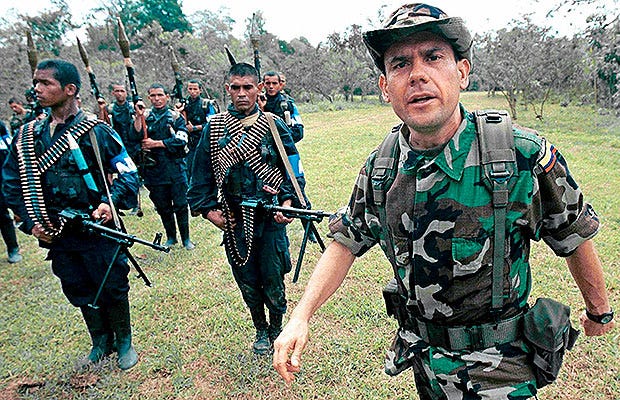Chiquita Brands already admitted to paying Colombian death squads: now victims get their day in court
A civil suit brought by families in the U.S. brings dark new details to light in the decades-long court case
United States fruit company Chiquita Brands is again squaring off against Colombian victims of paramilitary death squads in U.S. courts. The company was convicted in U.S. courts in 2007 for paying nearly 2 million dollars to the United Self-Defense Forces of Colombia (AUC) between 1994 and 2004.
According to court findings, the company paid 3 cents on the dollar to AUC forces for each box of bananas exported from the country. In recent years Colombia’s “Peace Court” has heard testimony from AUC commanders which reinforced the findings of U.S. courts as well as unearthed new details in the schemes the company used to try and hide funding the paramilitary group.
The AUC is responsible for thousands of civilian deaths, eradicated entire villages, orchestrated the murders of trade union representatives and rivals, and kidnapped politicians during the Colombian civil war. The group was declared a terrorist organization by the U.S. State Department in 2001. Families of the victims of AUC have been lobbying for years for the right to sue the U.S. fruit company in civil courts— petitions that Chiquita Brands has delayed with legal tactics for over a decade.
They will now finally get their chance. Two “bellwether cases”, sample cases selected from among the hundreds of plaintiffs, commenced preliminary hearings in Miami in May.
In addition to the payments Chiquita has already been convicted of, victims as well as ex-AUC commanders claim that the company delivered weapons and gasoline to the paramilitary forces in the region of Urabá, in Antioquia, Colombia. Victims argue that executives at the time were aware that these resources were being used to kill civilians and suppress unions in or near their operations in Colombia.
Chiquita has denied the accusations presented by the lawyers of the plaintiffs, arguing that the payments amounted to extortion and were made under duress. That same argument was rejected by U.S courts in the earlier decision against Chiquita, which ordered the company to pay a $25 million fine.
Victims of the AUC, however, did not receive a penny of that money, which went instead to the U.S. State Department. They have initiated claims in both Colombia and the U.S. to hold Chiquita Brands responsible for the deaths of family members killed by the AUC.
Chiquita Brands petitioned to move all civil cases to Colombian courts, but a judiciary panel in Colombia denied the motion and ordered the processes to be carried out in the U.S.
It is merely the latest turn in a long series of ongoing legal problems over Chiquita operations in Colombia. In August 2018, Colombia’s Prosecutor's Office formally accused executives at Chiquita of “aggravated conspiracy to commit a crime” as part of their funding criminal groups, as well as attempting to hide the funding in the company ledgers as “security payments”.
The case has dragged on for years, however, delayed multiple times via myriad legal tactics by Chiquita Brands lawyers. Colombia’s previous lead prosecutor, appointed by the business-friendly and right-wing administration of Iván Duque, suspended the investigation in 2019. The Prosecutor’s Office has long faced accusations of protecting powerful economic actors in the country as well as several corruption convictions from within its ranks.

But Colombia has a new independent lead prosecutor: Luz Adriana Camargo Garzón. Her controversial confirmation confirmation process, initially blocked by right-wing members of the judicial body responsible for vetting candidates, was finally completed earlier this year. And she has expressed interest in returning to proceedings against Chiquita Brands in public comments.
The Colombian Peace Court has argued that Chiquitas crimes, which include violations outside of the AUC payments, and include repression of labor unions in the country, amount to “crimes against humanity”.
The plaintiffs in the U.S. civil court case are represented by Earth Rights International, an NGO that describes themselves as “activists, campaigners, and legal strategists who challenge powerful institutions that violate peoples’ rights and destroy our planet for profit.”
The central issue in the case is whether Chiquita “acted reasonably in dealing with the AUC and whether the payments made to AUC materially assisted the AUC in carrying out its illegal actions,” according to court documents.
Charles “Buck” Keiser, who was in charge of directing Chiquita's operations in Colombia from 1987 to 2000, testified before the court on May 3. According to his statements, in an attempt to avoid becoming mired in the conflict, the company did not directly purchase farms in the country, but rather organized contracts to buy fruit from other growers.
During this period, the company also made payments to left-wing guerilla forces who then controlled the region.
But Keiser claimed that the company was being extorted and had been violently attacked multiple times by illegal armed groups, attacks which resulted in millions of dollars in damages and the murder of several workers.
Lawyers for Earth Rights International presented testimony from ex-AUC commanders, that high-level executives from Chiquita met directly with AUC leaders, and organized payments through independent contractors in an attempt to hide the illegal activity.
The rise of paramilitaries, or “paracos” as they are often called in Colombia, can be traced back to the presidency of Alvaro Uribe, who created a series of public programs called “Convivirs”, which legalized private financing of security groups to act as defense forces against left-wing rebel groups during Colombia’s civil war.
In theory, money deriving from these programs was prohibited from reaching illegal armed groups, such as the AUC. But in practice, investigators rarely looked into the details of paramilitary financing and the AUC quickly grew to become the largest of hundreds of “self-defense forces” in the country.
These forces worked directly with the Colombian military during the civil war, providing support, intelligence, and even aiding in the infamous “false positives” cases, in which over 4,000 innocent civilians were executed and recorded in government statistics as guerilla fighters.
Uribe himself is in legal trouble in Colombia as well. A criminal case accusing him of witness tampering via bribery and threats in relation to investigations into his connections to “paraco” groups began in April.
Colombia has taken steps to increasingly confront human rights abuses by both government forces and armed groups during the country’s 52-year civil war through independent investigations by a special body created for that purpose as part of the government’s peace deal with rebel group the FARC in 2016.
But justice has been slow and imperfect. Will the case currently unfolding against Chiquita Brands in Florida result in further transparency? The families of the millions of victims of Colombia’s civil war are certainly betting on that being the case.
The Big Headlines in LATAM
Nayib Bukele was sworn in on Saturday for a second presidential term in El Salvador, despite Constitutional law outlawing incumbents from running for re-election. He promised to focus on economic issues and continue his tough-hand policies on gangs.
The country has been under a temporary “State of Emergency” for over two years, which grants exceptional powers to security forces and curtails the civil rights of citizens. Crime has dropped as a result, though the cost to civil society has been considerable. El Salvadoran newspaper “El Faro”, writing from Costa Rica after fleeing the country due to state harassment called the swearing-in ceremony “the Beginning of a Dictatorship” on Saturday evening.
Mexico goes to the polls Sunday, and will almost certainly elect its first woman president. Former México City mayor Claudia Shienbaum, running on the ruling party Morena’s ticket, strongly leads in polls against her main rival Xochitl Gálvez, but Senate positions as well as thousands of municipal positions are also at stake.
The campaign has been the most violent in Mexico’s history. At least 31 candidates have been murdered since election season began earlier this year, most recently Jorge Luis H. in Izúcar de Matamoros", an alderman candidate on June 1st.
U.S. President Joe Biden announced on Friday that the White House will be releasing a sweeping executive order on migration that would limit daily asylum claims at the U.S.-Mexico border, increase deportations and possibly even deport migrants to Italy and Spain. Details on the order, which has not yet been signed, were not immediately clear.
Ship’s Log
Amy has departed Bogotá for Colombia’s northern coast, and currently finds herself in Cartagena (interestingly the site of the largest pirate naval battle in history, which of course the pirates won). She will reunite with Joshua and Daniela in a week, upon her triumphant return after a short vacation, to the Colombian capital.
Daniela meanwhile is still waiting for final confirmation from the Panamanian government for permission to enter the Panamanian side of the Darien Gap. Historically, they *really* don’t like journalists doing stories there.
And Joshua is headed off into the wild unknown for a few stories on the Colombian conflict. Cauca? Well, he’d like that very much. Just waiting to confirm a few details.
Spanish Word of the Week
Toche- ha! Let us explain.
In Colombian slang, at least near the Venezuelan border, toche is a word with infinite meanings. Most commonly, it is used to describe someone in a negative context. The Royal Spanish Academy suggests the slang term means something like “despicable”, but in our first-hand experience a much more accurate translation might be “asshole” or “prick”.
However, and this is a big however, you can never assume that is what someone means when they use it! When Joshua first arrived to Cucutá, Colombia, on the Venezuelan border, an innocent question to a friend asking her to explain the word led to a two-hour explanation that included multiple visual charts.
We think it’s easiest to explain with an example from the English language. Just as (please excuse our French, we’re about to use a lot of vulgarities, bear with us), “fuck” in English has been transformed from a verb into a noun, an adjective, an adverb, a general exclamation and even occasionally a compliment, the word toche takes many forms.
We think it’s best to simply show some examples rather than dwelling on infinite permutations that exist in the Colombian wild:
¡Que orgulloso me siento de ser CUCUTOCHE! - How proud I feel to be a fucking Cucuteño (resident of Cucutá)
No hay un toche que comer. - There isn’t shit to eat.
¿Dónde toches estamos? - Where the fuck are we?
Este guevon habla puras tochadas. - That idiot only tells lies.
Ese pobre toche, el toche ese no sirvió pa nada, este toche la cagó. - That poor asshole. The idiot was useless. He just fucked everything up.
Get it yet? No? Well, to be honest, neither do we understand 100%. But, the word radically changes based on context. Usually, it means something bad though. Unless it doesn’t. In which case, well….
Hey good luck if you ever visit Cucutá! Haha
Hasta pronto, piratas!







Not sure why you're putting the accent over the a in Cúcuta.
Very good. Thanks once again. Word of the week, Toche. Guao! Difícil! But thanks. Use with care.